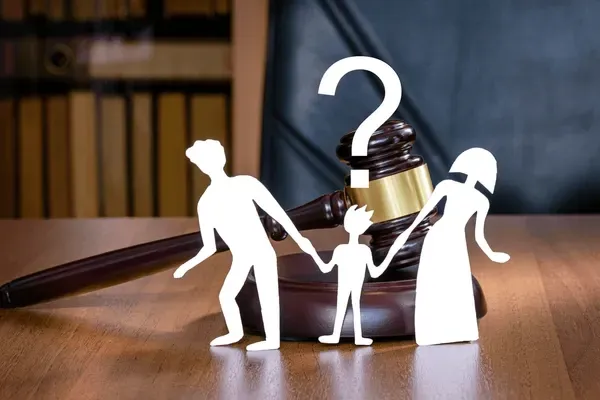How to Tell Your Children You Are Getting a Divorce
Family Law 101: 5 Tips on Talking to Your Children About Divorce

Family Law Divorce Tip 1: The Right Way to Talk
Separation is quite delicate, so you have to know how to talk to your children without triggering an extreme response. Here are some of the most crucial steps you need to take:
- Prepare yourself in advance
- Make sure the whole family is there
- Put the children’s needs front and center
- Be honest, but measured in your explanation
- Don’t show extreme emotions
When discussing a divorce, you should have a list of things that you want to tell your loved ones. It’s incredibly important that both you and your partner work on this list. That way, you might soften the impact of the news when you deliver it to your child.
Some families have more than one child, or have other members that live in the household (like grandparents). If possible, get all of the members together when announcing the news. After all, it’s an important family matter, so all of the family has to hear it and weigh in.
Sadly, a lot of parents think too much about their post-divorce lives and don’t focus on what the child needs at that crucial moment. So, when approaching your children, make sure to look at the situation from their perspective. It’s a scary and difficult change, and they need to know that everything will be alright. That’s where the art of explaining everything in an honest, measured way comes in. Let your child know about the important things: That you and your partner are both still going to be there for them, that your love for them hasn’t changed, and that you’ll both do everything you can to keep things going smoothly.
Finally, it goes without saying that you can’t show extreme emotions when discussing divorce. You might end up traumatizing your children further if you do.
Family Law Divorce Tip 2:
‘It’s Not Your Fault’
A child usually doesn’t have the same capacity for understanding the situations around them as an adult might have. This fact is especially true with toddlers and preschoolers. More often than not, there is one thing that almost all children gravitate towards when you tell them about separation. Far too often, they will think that this new situation is their fault.
Most family lawyers cannot overstate how important it is for you to convince your child that they did nothing wrong. Of course, doing that can be difficult for the parent, since there are marriages that fall through because of how hard parenting is.
Nevertheless, both you and your partner must reassure your children that the divorce didn’t happen because of them. Use lines like ‘It’s not your fault, sweety. It’s ours. We tried to make it work, but we failed.’ or ‘Remember, mommy and daddy love you very much. The kind of love we had for each other is different from the love we have for you. And while we might not like each other anymore, you will always be #1 to both of us.’
Family Law Divorce Tip 3: Be Open to Questions
Depending on the age range and their personalities, children will react differently to the news of a divorce. Some of them will avoid asking anything, while others will have a million questions. Since family law specialists emphasize the importance of communication, you should definitely talk to your child as often as possible.
Of course, you won’t always have all the answers. If that happens, simply tell the child ‘I might not have an answer now, but I will tell you as soon as I figure it out.’ By no means should you avoid answering a question or be abrasive about it. Take your time, be patient, and make sure to listen to your children carefully. By answering the question in the right way, you can help them cope with the situation and avoid any additional potential traumas in the process.
Family Law Divorce Tip 4: Expect Various Reactions
As stated earlier, divorce is incredibly difficult, and you, your partner, and your children can react to it in different ways. For example, your child might all of a sudden start behaving erratically and try to get your attention through bad behavior and habits. Other children will do the opposite; they’ll listen to every word you have to say without question and retreat into their own little world. Neither of these situations is good, according to family law.
When you spot emotions like anger, sadness, lethargy, hyperactive behavior, or sudden bursts of crying, you’ll know that you need to devote your time to your child. Usually, children will act out because they feel like they no longer matter to you, especially if your thoughts linger on the divorce too much. So, when you address their behavior in a proper way, you can reassure them that they’re still your favorite person in the world. The more often you do it, the quicker they’ll stop showing these extreme emotions.
However, try to keep track of your own behavior as well. When going through a divorce, parents become distant, distracted, cold, and unaware of the world around them. And naturally, a child can pick up on these negative emotions, which can hurt them indirectly. Of course, nobody is asking you to pretend that everything is fine. In fact, you can even shed a tear or two and connect with your child on a deeper level. But generally speaking, try to be as stable as possible. When they see you with confidence in your voice, your children will consider you a reliable figure and it’ll take their mind off of the problem.
Family Law Divorce Tip 5: A Team Effort
The most difficult thing to do is to cooperate with your partner in order to make sure your child receives the news well. This is especially true with couples who have heated rows and can’t stand to be around each other.
Once again, you must remember that your child’s well-being comes first. Explain that to your partner and start working together on maintaining a good parenthood. Try to create two households for your children, so they can feel safe and secure despite one of the two parents not always being around. Finally, discuss every detail you can with your partner about visitation hours, alimony, and other critical parts, and always do it with your child in mind.
A Few Closing Words
According to family law, both parents must make sure that their child has a safe, secure transition into a split household. Even if you do everything you can, always remember that the emotional stress will never really leave your child.
That’s why it’s critical to be honest and approachable during these tough times. Both you and your partner must talk to your child as often as you can, letting them know that you’re still a part of their life. In time, they will get used to the separation, and all three of you will start to heal soon enough.











